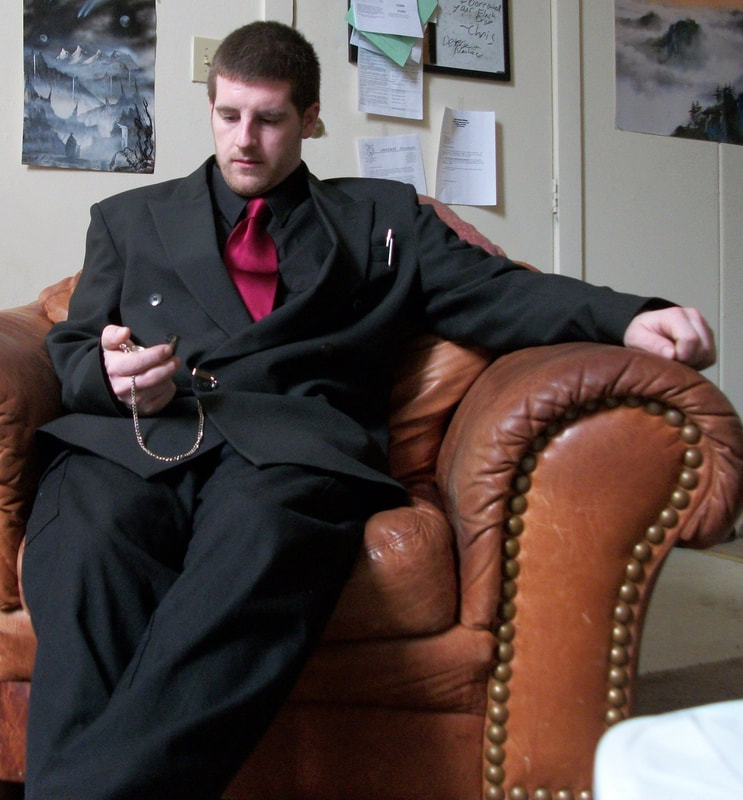|
Note: What follows is adapted from a sermon I first delivered on June 18 at The Chapel Downtown, a Saturday night gathering in a storefront hosted by my church and our local network of churches, with the aim of providing a space for people to encounter the gospel in the heart of the city over dinner and in a more casual setting than Sunday morning services. The lesson series is on the Sermon on the Mount. The original message pulled from the ESV; this has been changed to NASB for the website.
 Photo by Doug Kelley on Unsplash Photo by Doug Kelley on Unsplash
There's a weird law still on the books in Pennsylvania, where I grew up. It was first written when cars were new and fairly simple machines, rare on the roads and disruptive to a culture that wasn't used to them. The law states that, when a driver sees a horse coming on the road, they are required to pull over to avoid disturbing the horse. If the horse still seems nervous, the driver must shut down the car; if that fails, the driver must dismantle the car enough that it can be hidden in the bushes and pose no further threat to the horse and its ability to do its job. Now, I've encountered a great many horses while driving around in Pennsylvania, and I've never had to do any of that. The law still stands, but it isn't enforced, and no one really seems bothered by that fact. The reason for this is actually pretty simple: the relationship between cars and horses has changed in the century or so since that law was passed, and as such, the expectations for how both parties address both each other and the law has shifted.
Do not think that I came to abolish the Law or the Prophets; I did not come to abolish but to fulfill. For truly I say to you, until heaven and earth pass away, not the smallest letter or stroke shall pass from the Law until all is accomplished. Whoever then annuls one of the least of these commandments, and teaches others [to do] the same, shall be called least in the kingdom of heaven; but whoever keeps and teaches [them,] he shall be called great in the kingdom of heaven. For I say to you that unless your righteousness surpasses [that] of the scribes and Pharisees, you will not enter the kingdom of heaven.
|
Shall Not Abolish
|
|
Now, there are ways we try to work this out, and one of them is that modern Christians tend to recognize three main categories of the Law: the Civil Law, the Ceremonial Law, and the Moral Law. The Civil Law is a category we use to describe regulations that deal with the actual governing of the historic Kingdom of Israel (and, later, Judah) as a nation state. The Ceremonial Law is a category we use to describe regulations that deal with ritual cleansing and temple practice under the sacrificial system. The Moral Law is the category we use to describe that which is inherently sinful and not bound to any specific time, place, or system of practice. These categories are fine, and useful, and there are good reasons we recognize them, but it's important to note that Jesus isn't giving us room here to use that as an excuse to ignore any of those laws. He doesn't state that no stroke or letter shall pass from the Moral Law; He says the Law, the whole body of the Law, still stands. If the Law condemns something, it remains condemned. If the Law declared something as earning death, then that thing still warrants death. Nothing in this regard has changed.
Jesus doesn't even soften the Law. He actually holds people to a higher standard than the Law does! Note what He says about it in verse 20, "unless your righteousness surpasses that of the scribes and Pharisees, you will not enter the kingdom of heaven." That's a high standard! And it keeps coming up in the following verses, such as...
You have heard that the ancients were told, 'YOU SHALL NOT COMMIT MURDER' and 'Whoever commits murder shall be liable to the court.' But I say to you that everyone who is angry with his brother shall be guilty before the court; and whoever says to his brother, 'You good-for-nothing,' shall be guilty before the supreme court; and whoever says, 'You fool,' shall be guilty enough to go into the fiery hell
Matthew 5:21-22 (NASB)
You have heard that it was said, 'YOU SHALL NOT COMMIT ADULTERY'; but I say to you that everyone who looks at a woman with lust for her has already committed adultery with her in his heart.
Matthew 5:27-28 (NASB)
Again, you have heard that the ancients were told, 'YOU SHALL NOT MAKE FALSE VOWS, BUT SHALL FULFILL YOUR VOWS TO THE LORD.' But I say to you, make no oath at all, either by heaven, for it is the throne of God, or by the earth, for it is the footstool of His feet, or by Jerusalem, for it is THE CITY OF THE GREAT KING. Nor shall you make an oath by your head, for you cannot make one hair white or black. But let your statement be, 'Yes, yes' [or] 'No, no'; anything beyond these is of evil.
Matthew 5:33-37 (NASB)
No. But how? The simple answer is that our relationship to the Law has changed.
Come to Fulfill
|
|
 Photo by Tingey Injury Law Firm on Unsplash
Photo by Tingey Injury Law Firm on Unsplash
Consider meals. We, as humans, don't actually need meals as they presently exist. We need nourishment from food, and we need to eat at intervals that allow our bodies to process the nutritional value of the food without eating so much that we cause other problems. Meals are the means by which we, as a culture, meet that need and teach ourselves and our children about how to select foods and portions that best accomplish this purpose. But if someone, or a household, changes their relationship to the food in such a way that they can continue getting the food they need and practicing proper balancing of foods, without the structure of three square meals, then they would no longer need the socially normative meal structure. Their relationship to the food changed; meals did not get abolished, and their need for the basic function of meals still exists, but it is now being fulfilled through a different (and possibly better) way.
This is the essential nature of how Christ changes our relationship to the Law. The Law still stands, and our needs for its functions still stands, but those needs are being met in Christ and therefore we no longer find ourselves leaning on the Law for them. So, with that in mind, let's explore the functions of the Law and how Christ fulfills them. Because, for every function, Christ both removes the necessity of the Law's function and performs that function in such a way that we no longer need to lean on the Law.
Therefore, my brethren, you also were made to die to the Law through the body of Christ, so that you might be joined to another, to Him who was raised from the dead, in order that we might bear fruit for God. For while we were in the flesh, the sinful passions, which were [aroused] by the Law, were at work in the members of our body to bear fruit for death. But now we have been released from the Law, having died to that by which we were bound, so that we serve in newness of the Spirit and not in oldness of the letter.
Romans 7:4-6 (NASB)
Revelation of God's Perfection
|
|
When I first delivered this message, I got permission to change the way we did communion for that service. This was because I wanted to allow communion to serve its function as a sign in a robust way by incorporating it into the lesson itself. At this point, then, I called on the people to take up the bread of communion. I told them to remember, as we held the bread, that the ultimate revelation of God's perfection and love was given to and broken for us, and that we will one day enjoy the perfected flesh that Christ now bears in His resurrected body. That Christ took on the function the animals bore in the sacrificial system, and in doing so, fulfilled the function of the Law in revealing God's glory. We no longer need the broken bodies of animals to tell us of God's perfection; the glorified body of Christ is more than sufficient for the task.
At this point, we ate together.
Revelation of Our Need
|
|
At this point, we drank together.
Setting God's People Apart
|
|
He. Teach me, O LORD, the way of Your statutes, And I shall observe it to the end. Give me understanding, that I may observe Your law And keep it with all [my] heart. Make me walk in the path of Your commandments, For I delight in it. Incline my heart to Your testimonies And not to [dishonest] gain. Turn away my eyes from looking at vanity, And revive me in Your ways. Establish Your word to Your servant, As that which produces reverence for You. Turn away my reproach which I dread, For Your ordinances are good. Behold, I long for Your precepts; Revive me through Your righteousness.
Psalm 119:33-40 (NASB)
At this point I reminded them that we are not merely set apart individually, but together; we are set apart as one body, and our sharing of communion declares our unity with Christ and with each other.
Our Response
|
|
For as many as are of the works of the Law are under a curse; for it is written, "CURSED IS EVERYONE WHO DOES NOT ABIDE BY ALL THINGS WRITTEN IN THE BOOK OF THE LAW, TO PERFORM THEM."
Galatians 3:10 (NASB)
But for the rest of us, for anyone reading this who is in Christ, we have some questions to answer. Are you living like you are in Christ? Or are you, instead, still trying to trust in the Law? I don't only mean in terms of salvation. I'm asking if we're still looking to the Law to do work in us that only Christ can do. Are we being made perfect by Christ, or by the Law? Are we looking to Christ for how to live our lives, or the Law? Are we looking to the Law to tell us who God is, or are we looking to Christ? What is it that sets us apart from the world around us? Do we look any different from the world around us, and if we do, is it because of the radical shift in perspective, the perfect love, that comes by relying on Christ? Or is our own separation found in what we condemn, what we hold accountable to the Law? If we are not distinct, then something is wrong. And if we are distinct, but only in our desire to wield the Law against one another and against the world, then something is wrong. We must be a people who let Christ do what He has promised to do in our lives, and not people who return to faith in the Law for results.
Understand, it isn't that running for office is a bad thing, it's that my heart wants it for bad reasons. If I go into politics, I can let myself believe that I'm saving the world and doing it my way. But ministry, which I have been called to, doesn't allow that. Ministry has a knack for reminding people that we are just servants participating in God's work, and his plans are far better than ours. When I am fighting off the temptation to turn astray from my calling to pursue public office, I am fighting off a very direct idol of self and trying to reject following and trusting God. This will look different for all of us, but we must not give in to whatever it is that pulls our affection away.
| I came close once. In the 2010 election cycle I went so far as to request the necessary paperwork to run for office and started filling it out and collecting signatures. I was registered as a Republican instead of a third party specifically so I could get some money from someone to fund the campaign. I went to dinner with this one girl and it came up that her dad was a liberal third party candidate for the same office I was trying to run for (Massachusetts 1st District, U.S. House of Representatives) and she never spoke to me again. I was pretty serious about it, and it seemed like a good idea at the time. But something started to nag at me that had been on my mind for about a year already. |
I never turned the paperwork in.
Now my friend and I have joked about the fact that, afterward, there were emails about that sermon. I got emails about that sermon. He got emails about that sermon. These were not terribly encouraging emails. I haven't been back to his church. The real reason is that my family moved two hours away and I got pretty busy with another church so the opportunity just hasn't been there as much, but when we ran into each other at the Small Town Summit I joked that it was because of the emails we got from that sermon. My pastor sat in on the sermon and when he heard about the emails he told my friend that he wasn't really surprised. It truly is an act of grace that my pastor let me preach at our church after that.
But in one of those emails, a member of his church asked me what he seemed to think would be a gotcha question. "If you knew that being elected would ensure that you could stop abortion right now," he asked, "and save the lives of so many precious little ones, would you do it?" He was trying to get me to confess to a certain reliance on political power that I had condemned in the sermon, and oh, how tempting that question was. Not only because I am pro-life, but ever since the 2016 election I had been struggling even more with the temptation to get elected and burn the whole system down from inside. This guy was pushing exactly the right button, and I realized it wasn't an accident. So I prayed before I replied.
"I would not run," I answered. "Not because I do not value that cause, because I do value it; but because God has called me to a different path and I would rather turn down a great work than refuse that which God has commanded." I hit send and never heard from that guy again. And that moment has given me great comfort ever since.
When people ask me why I feel called to serve in full-time ministry I usually tell them that God has told us as much, and has confirmed that calling multiple times. What I don't mention as often is that He has also made it very clear that I don't belong anywhere else. Any time I go off and start trying to make my own plans and serve my own interest about things that I think will make me feel important and powerful and successful at forging my own path and saving the world because obviously I'm really equipped to be the savior of the world, He makes me choose. And each time, I have to stop and look at the door I'm trying to force open and be reminded of the one He's put my name on, and I have to let go.
And it gets easier. There are things I still struggle with and I'm sure there always will be, but they're diminishing and changing. As I have matured and grounded my joy on Christ more, I have found myself pushing off in my own direction less often. Because in the end, none of my attempts to make my life work by my rules ever brought me lasting joy or peace. Just look at the rest of the posts in this series and see a sampling of the pain I've endured and inflicted on others through my quest for self-fulfillment. When I serve me first, I can drift off into becoming a true monster, and it isn't worth it. Are you any different, really? Does your idolatry of self improve your life and soul and mind any more than mine has?
The Leader's Guide had us close the final session with Psalm 16, and while the whole psalm is worth consideration, I want to highlight two verses as I end my thoughts on this series.
I said to the LORD, "You are my Lord;
I have no good besides You."
...
You will make known to me the path of life;
In Your presence is fullness of joy;
In Your right hand there are pleasures forever.
Psalm 16:2, 11 (NASB)
As Idleman has been saying throughout the series, the core issue is trusting in anything other than God to do what only God can fully do. It is trusting in anything other than God for our salvation, whether eternal or immediate. The idolatry of money looks like treating money as our functional purpose, our immediate savior, our great help in time of need. It looks like basing our identity on our net worth. My one friend back home, who lived in a lower-income part of town, showed this idolatry when he refused to let our friend from a nicer part of town enter his home for years because of what he assumed the higher class friend would think of him on seeing his house, just as surely as the 1% show it by flaunting their wealth.
It's so easy to fall prey to this one, far easier than we tend to acknowledge. After all, money goes a great distance in defining our daily lives. Study after study has shown that our income bracket has a direct impact on the economic and higher educational opportunities available to us, our access to healthcare, our mental state, our likelihood of crime and drug addiction (and the punishment when we're caught), and the quality of our public schools.* We are judged constantly on our income, inside and outside the church. I have been turned away from a preaching class hosted by my pastor because my two work incomes still weren't enough to get us off food stamps and I was deemed "worse than an unbeliever" and therefore unable to preach based on a particular, and I believe twisted, read of 1 Timothy 5:8. I've had disputes with people, Christians and non, about whether or not I was allowed to use those same food stamps to buy something nice for my family once in a while instead of just the bare minimum every meal. These are Christians defining their views on morality based on income (amusingly enough, these same Christians will condemn the prosperity gospel without ever apparently seeing the connection they have to it).
It's natural to want to avoid these things, we want to avoid being the ones who get judged and dismissed and ignored because of our socioeconomic class. I can tell you that living that life is not comfortable or enjoyable. And there's nothing wrong with wanting to give our families a better life, to oppose injustice, to engage with our culture in a different way. But what can happen is we can view the trials we face as being bigger than the God we claim to serve, and put the opinions of individuals and our culture above the view God has of us. And once we do this, once we allow ourselves to be defined by something other than our identity in Christ and rely on something other than God for our immediate salvation and hope, we have set up an idol.
Our self-examination on these issues needs to go beyond the obvious. We need to be willing to submit to actual scrutiny of our intentions, our desires, our hopes and fears. And whenever an idol is found hidden away in one of these corners, we need to have the humility to repent and hand its place over to God.
Envy | |
The big question raised when discussing envy in the session was, "what does my envy say about who or what I actually value?" The very nature of envy is such that it reveals our desire for something other than what God has granted us, and this raises the question: are we seeking after Him and His glory, or are we seeking after something else? Are we more concerned with fame or money or validation than faithfully serving our Lord in whatever capacity He has determined? When we grow envious of the ministry someone else has been called to, we reveal that something about their ministry is so valuable to us that the gifts of God in our own lives don't quite make up for not having it.
So what do we do about it? Fundamentally, they said, envy has pride at its root. We fall into envy because our idea of ourselves says that we deserve what these other people have. So the first step in fighting our envy is to fight our pride.
|
One phrase that actively attacks our pride are the words of John the Baptist in John 3:30, that "He must increase, but I must decrease," but this only helps us stay humble if we take it at face value. They cited an interview with Roy Ortland where he confessed that he has been tempted to view ministry as more like "He must increase, and I must increase."
|
A humble Christian is content to be laid aside if God has any other tools to work with which may bring Him more glory. |
But addressing our pride is just the first step. We cannot simply remove the desire to be great and not replace it with something else. That there is joy in serving God and serving others in His name, and we can pursue that joy as something greater than our markers for success or our own ideas on what a perfect ministry would look like. Ultimately, the cure for envy is the joy of the Lord in whatever we do.
Rest | |
Taking time to rest also glorifies God in its own way. It was noted that taking time to rest reminds us and others that God doesn't actually need us; He can see to it that the church is tended, even on our days off. It also showcases the fact that we, as Christians, rest in the completed work of Christ. We are not constantly striving and pushing and breaking ourselves to honor Him, but rather we can trust, and rest, and enjoy Him in all that we do.
Bitterness | |
They pointed out that Jesus is, ultimately, the One who will both honor us and provide our needs. These are things He promises to do in His word, and when we put weight on our churches to do that beyond their ability (or ours, often in the case of honor) we feed that disappointment and encourage bitterness. Ultimately, what we want from our churches when we go down this road is something that only God can provide, and we need to repent and trust in Him to do what He has promised to do.
What things do we allow to steal our joy? What does it look like to repent, and to trust God?
Archives
January 2023
September 2022
August 2022
June 2022
May 2022
April 2022
March 2022
January 2022
January 2021
August 2020
June 2020
February 2020
December 2019
November 2019
October 2019
July 2019
June 2019
May 2019
February 2019
December 2018
November 2018
October 2018
September 2018
Categories
All
1 Corinthians
1 John
1 Peter
1 Samuel
1 Thessalonians
1 Timothy
2 Corinthians
2 John
2 Peter
2 Thessalonians
2 Timothy
3 John
Acts
Addiction
Adoption
Allegiance
Apollos
Baptism
Baptist Faith And Message
Baptists
Bitterness
Book Review
Christ
Christian Living
Christian Nonviolence
Church Planting
Colossians
Communion
Community
Conference Recap
Conservative Resurgence
Deuteronomy
Didache
Discipleship
Ecclesiology
Ecumenism
Envy
Ephesians
Eschatology
Evangelism
Failure
False Teachers
Fundamentalist Takeover
Galatians
General Epistles
Genesis
George Herbert
Giving
Gods At War
God The Father
God The Son
Goliath
Gospel Of John
Gospel Of Matthew
Great Tribulation
Heaven
Hebrews
Hell
Heresy
History
Holy Spirit
Idolatry
Image Bearing
Image-bearing
Immigration
Inerrancy
Ireland
James
Jonathan Dymond
Jude
King David
Law
Love
Luke
Malachi
Millennium
Mission
Money
New England
Numbers
Pauline Epistles
Philemon
Philippians
Power
Pride
Psalms
Purity
Race
Rapture
Redemptive History
Rest
Resurrection
Revelation
Romans
Sabbath
Salvation
Sanctification
School
Scripture
Series Introduction
Sermon
Sex
Small Town Summits
Social Justice
Stanley E Porter
Statement Of Faith
Sufficiency
Testimony
The Good Place
Thomas Watson
Tithe
Titus
Trinity
Trust
Victory
Who Is Jesus
Works
Worship
Zechariah




 RSS Feed
RSS Feed
